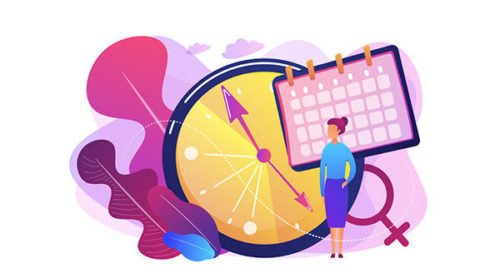In the medical world, women who are 35 or older at the time of delivery are considered “advanced maternal age” (AMA). The purpose of this designation is not to piss women off, but to determine who needs a little extra attention during pregnancy (and during the preconception period).
There’s nothing magical about the number 35. It’s simply an age at which certain pregnancy risks become more pronounced. These risks include (but aren’t limited to):
- Decreased Fertility: A woman’s chance of getting pregnant each cycle declines with age.
- Women under 25 have a 25% chance of conceiving each cycle (assuming they don’t have any underlying fertility issues).
- Women ages 35 to 39 have a 15% chance of getting pregnant each cycle. 82% of these women get pregnant within a year.
- By age 40, women have a 5% chance of conceiving each cycle.1 Sounds dismal, I know, but with all of the medical advances out there, it’s still possible-it just might take a bit longer.
- Women under 25 have a 25% chance of conceiving each cycle (assuming they don’t have any underlying fertility issues).
- Chromosomal Abnormalities: This is the one that most pregnant women age 35 & older worry about. Because we’re born with all of our eggs (and we don’t recycle them like men recycle their sperm), our eggs age as we age. As our eggs get older, there’s an increased chance that the chromosomes they contain will mutate, leading to chromosomal abnormalities (like Down Syndrome).
Reality Check: The risk of chromosomal abnormalities in “AMA women” is still low.
For example, a 25-year-old woman has a 0.08% chance of having a baby with Down syndrome, whereas a 35-year-old woman’s risk of having a baby with Down Syndrome increases to 0.3%.2 Although this represents a fourfold jump in the risk of Down Syndrome, the percentage is low overall.
Insider Info: Pregnant women can undergo prenatal genetic testing to determine their baby’s risk of having Down Syndrome and other inherited disorders.
- Having a C-Section: Women of advanced maternal age have a higher risk of having pregnancy-related complications that require a C-section.
- Giving Birth to Twins (or Multiples Above That), Even Without IVF (In Vitro Fertilization):
Why? Because women of advanced maternal age are more likely to release extra eggs during ovulation (instead of the usual 1 egg).
- Developing Gestational Diabetes: Gestational diabetes is diabetes caused by pregnancy. It goes away after the baby is delivered.
- Having a Miscarriage (as a result of the increase in chromosomal abnormalities).
- Delivering Their Baby Prematurely (Before 37 weeks) or Having a Baby With a Low Birth Weight.
Okay, Fine, I’m “Advanced Maternal Age.” What Should I Do About It? Become Celibate and Curl Up with a Cat?

No Way!
1. First of all, know that you’re in good company. Today, women are choosing to have babies later in life (as a result of delaying marriage, focusing on their careers, etc.). In fact, 1 in 7 babies are born to women over age 35 (vs. 1 in 100 babies in 1970).3
2. Second, while there are some risks associated with having a baby at age 35 or older, there are advantages as well. For example, you’re (probably) more mature than you were in your 20s, have better health insurance, and may be more financially stable.
3. Third, there are certain steps that women can take to maximize their chances of having a healthy baby during a “geriatric pregnancy.”
These Include (But Aren’t Limited To):
- Seeking Regular Care. See your prenatal provider before you conceive and keep your routine prenatal appointments.
- Laying Off the Booze, Nicotine, and Illegal Drugs (Pot Included!) During Pregnancy.
- Getting Your Chronic Medical Conditions (If You Have Any) Under Control.
- Choosing a Healthy Lifestyle (By Eating a Balanced Diet, Exercising Regularly, and Not Going Wild with Your Pregnancy Weight Gain).
- Getting Wise About Prenatal Genetic Testing. The American College of Obstetricians and Gynecologists (ACOG) recommends that doctors offer ALL women of advanced maternal age prenatal genetic testing to look for chromosomal abnormalities (like Down Syndrome) in the fetus.
- Being Kind to Yourself and Limiting Stress.
Common Question: What About Dads? Are They Considered (Reproductively) “Old” at 35 Too?

The Short Answer: Sort Of.
The Longer Answer:
- Men aren’t off the hook, either, when it comes to procreating at an “advanced paternal age.”
- Although men are continuously churning out new sperm, both sperm counts and sperm motility decrease with age.
- In fact, research shows that men who are over 40 (at the time of conception) have an increased risk of having a child with:
- Autism Spectrum Disorder (a 6-fold risk).
- Marfan Syndrome (a rare chromosomal mutation).
- Leukemia (a type of cancer).
- Autism Spectrum Disorder (a 6-fold risk).
For these reasons, the American Society for Reproductive Medicine recommends that sperm donors be under the age of 40.4
The Bottom Line
At times, bullet-point facts can make things seem more dire and depressing than they actually are. The bottom line is that the vast majority of Moms-to-be with “Advanced Maternal Age” (AMA) status give birth to perfectly healthy babies (even when they’re procreating with “older” Dads-to-be). AMA women just need to be aware of certain risks so they can receive the appropriate care (and surveillance) during their pregnancy.





